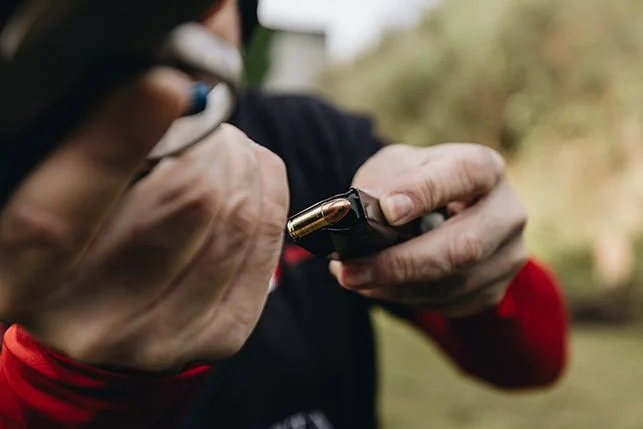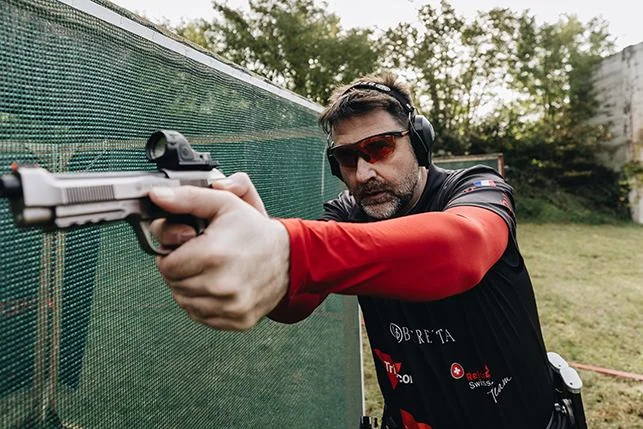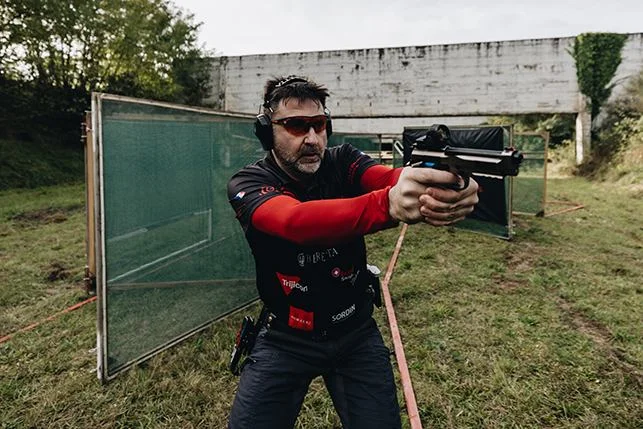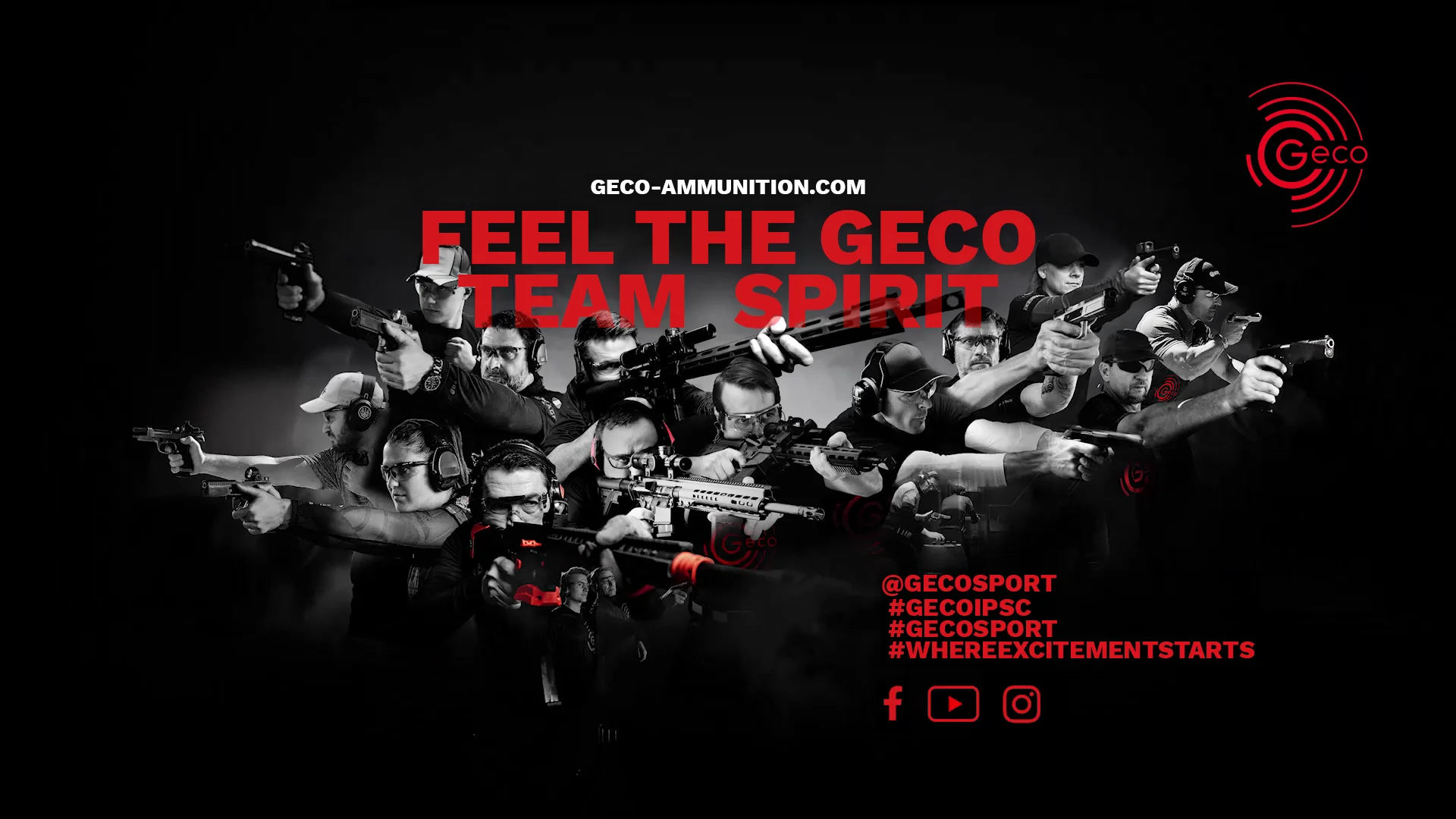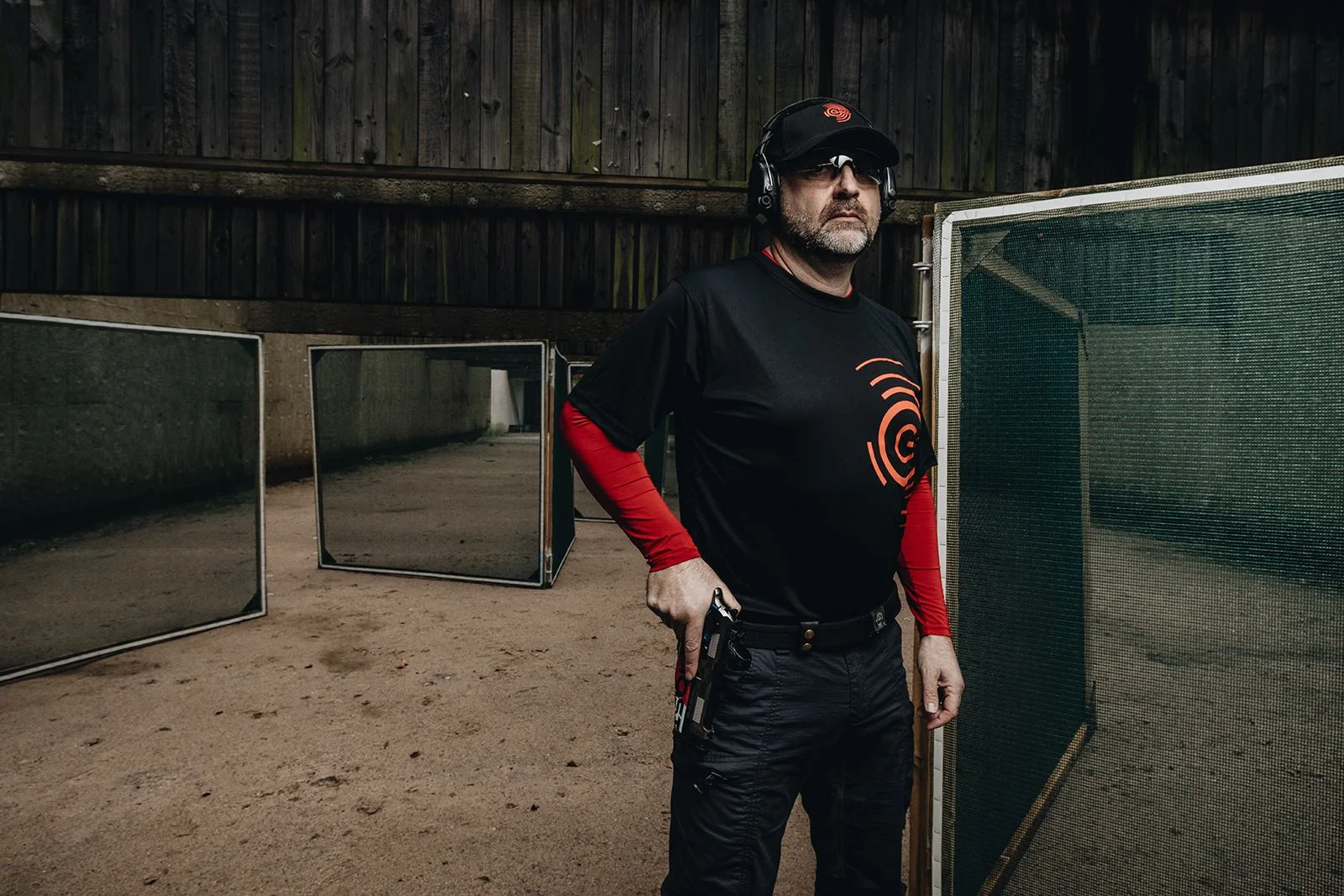
SHOOTING PORTRAIT:
PATRICK BACULARD
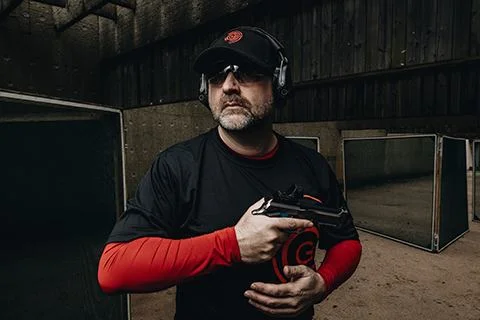
GECO IPSC Team Shooter
Patrick Baculard, France
Patrick Baculard discovered shooting in 1980 when he picked up an air rifle with his father. This was the beginning of a lifelong passion that continues to this day. After mastering the air rifle, he switched to the .22 lr. While out walking in the mountains of Vaucluse, he came across IPSC quite by chance and was immediately hooked on this shooting sport. He started shooting in the IPSC Open Division in 1993 and soon found himself on the world stage, competing in championships in South Africa, Ecuador, Greece and Florida.
His dedication and skill led him to numerous international competitions, where he won many victories and podium places. Today, he shoots Beretta pistols and GECO cartridges, mainly in the IPSC production optics division. He has been an IPSC instructor for many years and has been training a dedicated group of 30 shooters in his club for more than two decades. Since 2023, he has been a member of the French Shooting Federation's instructor group, where he is involved in training new instructors.
HONEST AND FRIENDLY
The fun-loving marksman from the south of France is a true all-rounder in the shooting sport. Whether open, standard, production or production optics division, Patrick quickly adapts to any handgun and challenge.
As the winner of numerous Level 3 competitions in all IPSC divisions, Patrick is a top trainer in this demanding shooting sport. With over 300 international competitions under his belt, his expertise is second to none. He recently won two bronze medals in the finals of the French Championship. His weapon of choice: the famous Beretta 92x Performance in 9 mm Luger.
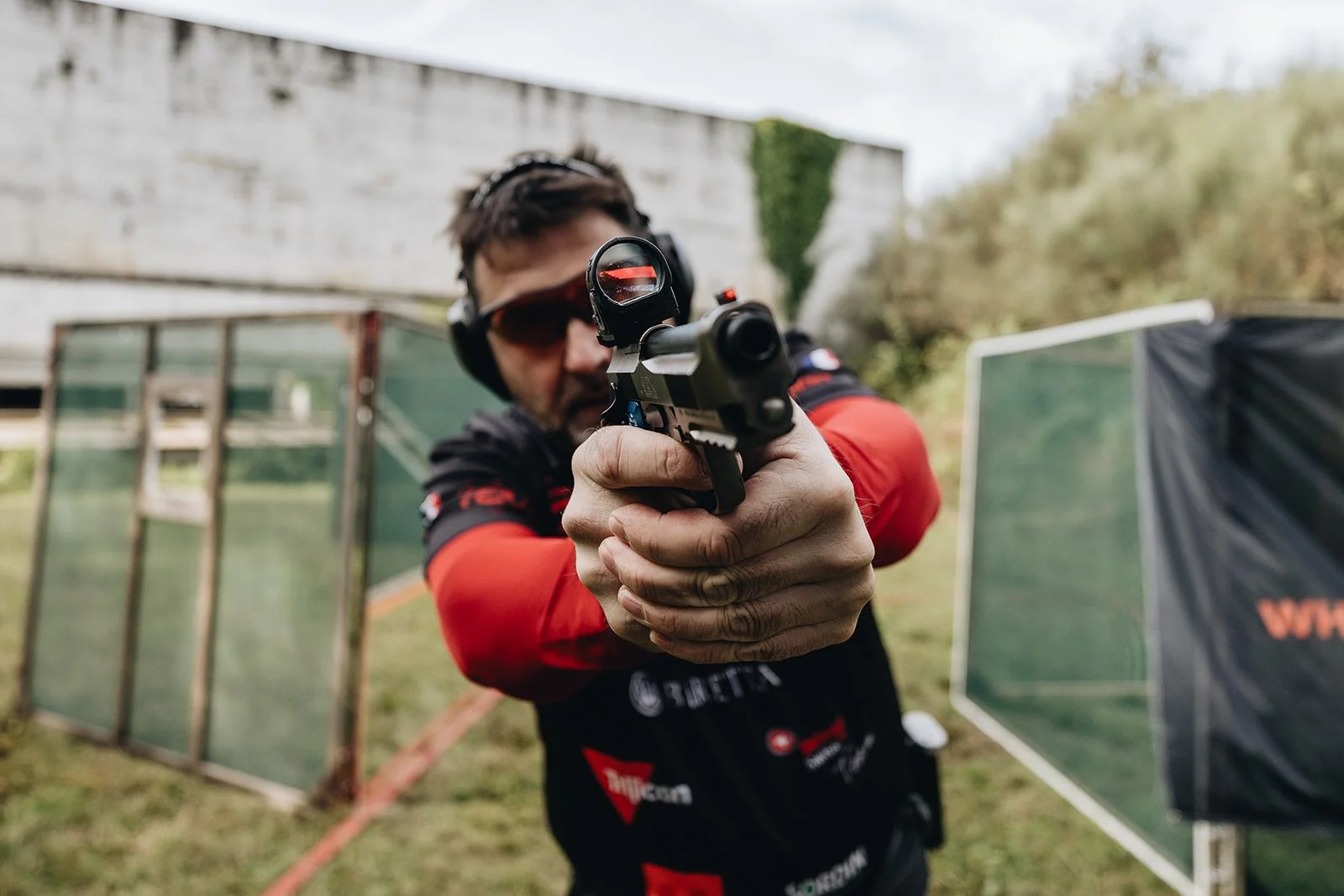
RELIABLE AND TESTED EQUIPMENT OF HIS CHOICE
For competitions, he uses GECO 9 mm Luger/124-grain FMJ ammunition from his Beretta 92x Performance. For training, he uses his tried-and-tested hand-loaded cartridges, consisting of Reload Swiss RS12 powder and 124-grain GECO FMJ bullets.
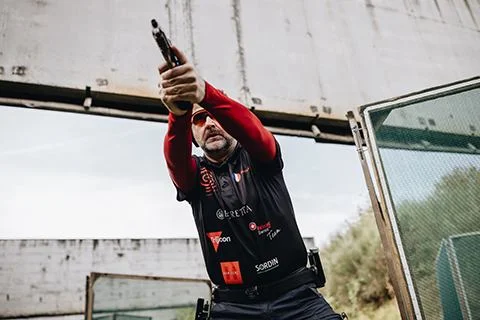
"At the French Championships 2024 last May, I only had to compete in the final in the production optics division. I trained hard and managed to win the silver medal. The day after the final, I also shot the production final "spontaneously", without red dot, and also with the Beretta 92X Performance. The pistol was actually brand new and I had never trained with it in this discipline. To everyone's surprise, I won the silver medal here too. It was a very emotional moment for my whole team. A wonderful week!
GECO cartridges for Beretta pistols = the absolute winning pair!"
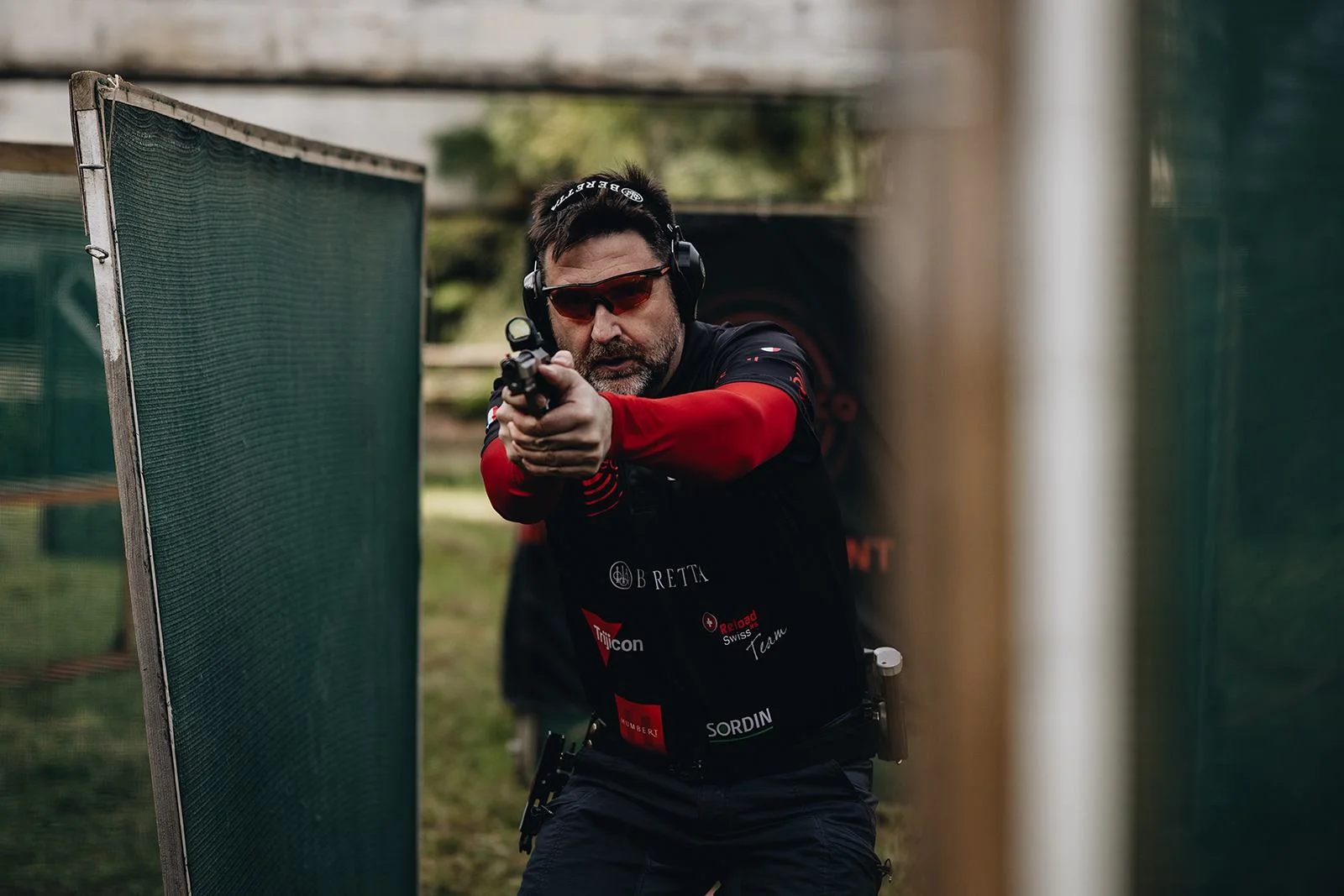
QUICK-FIRE INTERVIEW WITH PATRICK BACULARD
PRACTICE MAKES PERFECT
How do you prepare yourself in the off-season?
In the off-season, I do non-stop sports and shooting training. For IPSC, this period lasts from the end of October to the beginning of March. It involves a lot of excessive sports and shooting.
How do you approach off-season training?
I approach off-season training by going back to basics and focusing more on accuracy than speed. One important technique I work on constantly is proper trigger control.
Can you describe your dry-firing training?
I try to shoot at home every day during my dry-firing training. However, it is quite a challenge to balance work and various sporting activities during the week.
What kind of physical training do you do?
As far as physical training is concerned, I do weight training and have recently started cross-fit. I also play football for two hours once a week. To further improve my performance, I have hired a fitness trainer.
What mental training methods do you find effective?
For mental training, I find total relaxation of the body and mental visualisation of the shot to be very effective. This helps to stay focused and calm during competitions.
THE COMBINATION OF INVENTORY AND EXPERTISE MAKES IT POSSIBLE
Are there any changes to your equipment or gear in the near future?
As for upcoming changes to my equipment, I plan to purchase a new gun in 2025. The high rates of fire in IPSC are quite destructive to our guns and make this update necessary.
What changes do you make to the configuration of your weapons?
I also make changes to the configuration of my weapons by modifying and improving the firing mechanisms, with a particular focus on the springs.
Do you plan to update your shooting equipment?
At the moment, my equipment is perfect and I see no need to update anything other than my match rifle.
What is the most important piece of equipment for you?
As far as the importance of equipment goes, I don't think any piece is more important than another. A good weapon with a bad cartridge is useless. At a high level, everything is equally important. You need a good weapon and a good cartridge; they are inseparable.
THE RIGHT AMMUNITION FOR THE WINNER
How do you source and test your ammunition?
I source and test my ammunition by reloading my cartridges with a Dillon 1050. After reloading, I test them for accuracy and velocity.
How do you select the components of your hand-loaded ammunition?
To balance the components of my hand-loaded ammunition, I calculate the power factor. The weight of the bullet multiplied by its velocity in feet per second, all divided by 1000, should result in a power factor of over 125. I design my ammunition to have a power factor of just over 130 PF. The Beretta pistol works perfectly at these velocities.
How much ammunition do you use per year?
Ideally, I shoot about 30,000 rounds per year.
Do you make a distinction between training and competition ammunition?
I don't make a distinction between training and competition ammunition because the feel has to be the same.
PLANNING THE SEASON
How do you plan your competition season?
From the beginning of March to the end of October, I focus on international competitions. I travel to Italy and Germany quite often, about 10 times a year. This year I have already been to Germany four times and to Italy three times, and I also took part in a few competitions in France.
How many international competitions do you plan to take part in?
I plan to take part in about 7-8 international competitions.
What are your main competition goals for the coming season?
My main competition goals for the coming season include the World Championships in South Africa and the final of the French Championships.
How do you prepare for the big competitions?
Preparing for these big competitions involves intensive shooting training and close cooperation with my sports trainer.
WINS AND LOSSES
What motivates you to take part in IPSC competitions?
My motivation to take part in IPSC competitions comes from the desire to constantly surpass myself and strive to be better, faster and more accurate.
Can you tell us about a particularly successful or enjoyable competition?
It is difficult to remember a particularly successful or enjoyable competition, because the joy of victory is fleeting. As soon as I leave the podium, I think about the next competition and the improvements I need to make.
Have you ever had a competition that didn't go well?
I've had several competitions that didn't go well. But I always learn from these failures and use them positively to move on.
PARTICIPATING IN A COMPETITION
What is your strategy when you go to a competition?
My strategy when participating in a competition is to identify the targets, understand the lighting conditions (which is very important for me) and find the best shooting angles.
How do you deal with being the first shooter in a competition?
I cope very well with being the first shooter in a competition because it can put pressure on my opponents.
How do you prepare on the day of the competition?
On the day of the competition, I try to be as relaxed as possible. I follow a set routine, which includes a final check of my bag and my weapon.
How do you eat during the competition?
During competitions, I eat very little to maintain my concentration and energy.
What is your strategy for the different types of competitions?
My strategy for the different types of stages is to stay relaxed and to hit as many alphas as possible at the highest possible speed.
What types of stages do you like or dislike?
I prefer long races because they are physically more demanding and more intense than short stages.
What advice would you give to a beginner in IPSC?
To a beginner in IPSC, I would advise them to focus on scoring points rather than getting carried away with speed, and always listen to the advice of experienced shooters.

